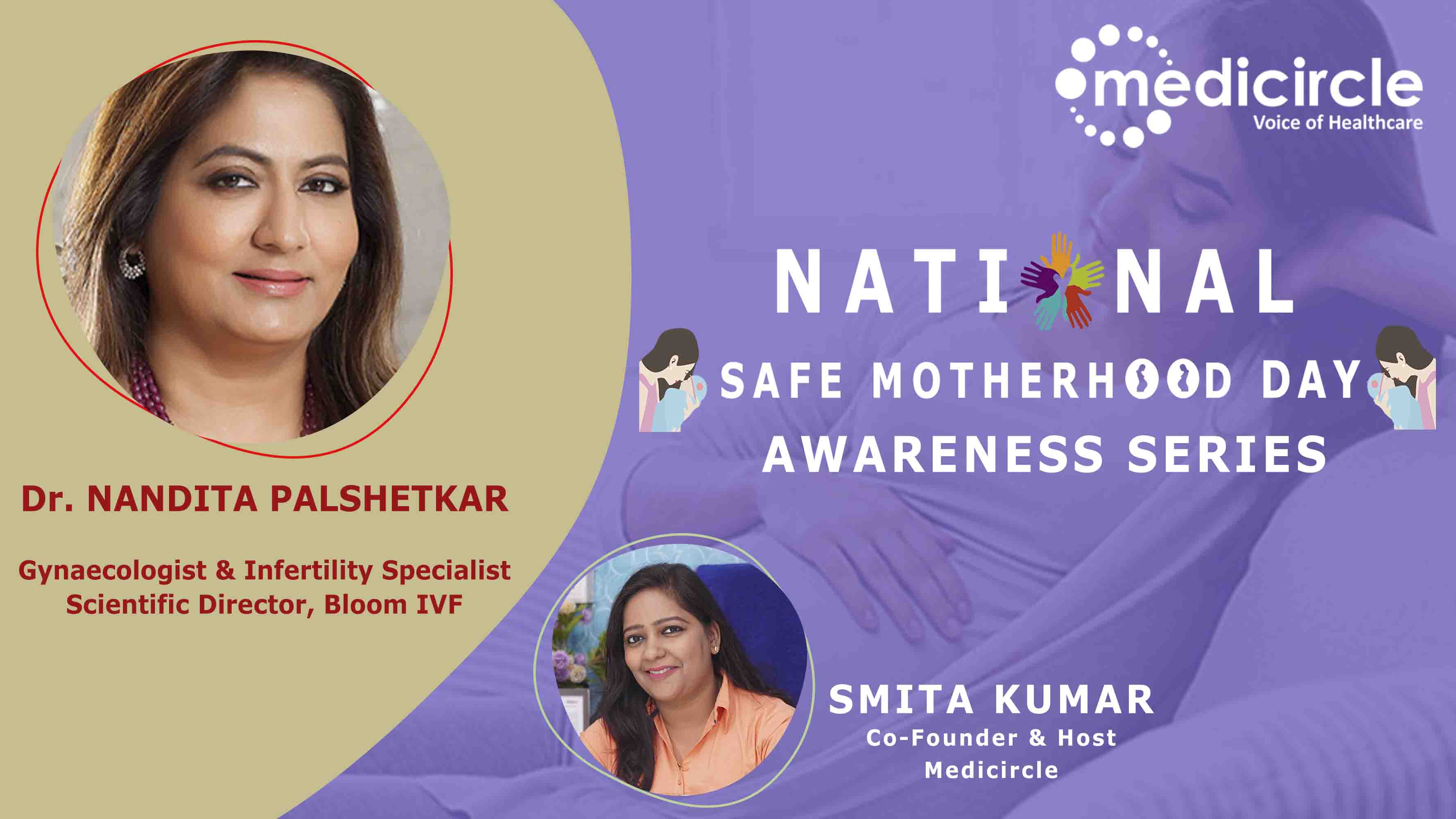Being a mother is one of the most phenomenal events in a woman's life. Nothing gives some more joy than holding a baby in her arms. But for some women, it is a challenge being a mother during all this for the ongoing outbreak of the coronavirus pandemic. Feeling anxious and feeling of uncertainty have crept in during the otherwise happy time and yet they have handled the situation quite gracefully. At Medicircle, we present to you the National Safe Motherhood Awareness Series, wherein we are featuring some successful Mompreneurs, Obstetricians and Gynecologists, other healthcare professionals, and entrepreneurs who are working on safe motherhood to raise awareness about adequate access to care during pregnancy and childbirth and postnatal services.
Dr. Nandita Palshetkar is the Scientific Director at Bloom IVF. She is one of the best IVF specialists in India, who combines a high level of medical expertise with the latest IVF treatment-related medical technology to offer high success rates among Infertility treatments. Dr. Palshetkar has the record of being the first to establish Assisted Laser Hatching in India in 1998. She is credited with the first Laser Hatched twins in India. She is also credited with an average IVF success rate of 35 to 45% in starting cycles and women under 35.
Important factors for safe motherhood
Dr.Nandita Palshetkar says, “I have been treating women for 30 years. I am an infertility specialist but my passion is to work towards women’s health. Giving birth is the most beautiful experience for every mother. It is her fundamental right to have a safe and respectful delivery is very important. Making women safer, smarter, and stronger is important.
- Nutrition: Nutrition is very important during the early stage of growth. Educating them right from school is very important.
- Anemia: It is extremely important to check nutrition in girls and women to correct anemia which may lead to blood loss in women. Anemia can be treated with iron supplements and nutrition.
- Unwanted pregnancies: There are 30 million deliveries in a year. Out of this, on third or deliveries are unwanted pregnancies. It is important to educate women about contraception to reduce the rate of unwanted pregnancies.
- Family planning: The right should be given to the woman about her choice of contraception. The spacing of pregnancy is very important.
- Abortions: 30 - 50 % abortions of unsafe. Abortions are legalized in our country. The doctors should be sensitive and nonjudgemental towards women is essential
- Antenatal care: On 9 th of every woman, the government started “Pradhan Mantri Surakshit Matritva Abhiyan” which was conducted to detect the high-risk patients in the women population. Out of the entire female population, one crore woman was identified as high-risk patients and was treated.
Important check-ups and regularly follows are a must during pregnancy
Dr.Palshetkar informs, “WHO has informed for three health checkups during the 3 trimesters of pregnancy. There should be two visits to the doctor during the 1 st trimester with two ultrasounds. If it is possible, try to visit your doctor every month for regular check-ups during pregnancy. High-risk factors such as PCOS, high BP, and diabetes due to obesity need special attention. Females who are lean and thin can have malnourishment and also fall under high-risk factors. These 9 months of pregnancy are very important to eat healthy food and remain happy which is very important for growing a baby. If you have access to healthcare, go for a monthly health check-up during pregnancy. Quality and respectful care is a must for every mother.”
An initiative by the Indian Government: LaQshya-manyata
Dr. Palshetkar states, “LaQshya-manyata is an initiative by the Maharashtra government which is appreciated. There is a massive improvement in the Maternal Mortality Rate by the government of India. In 1990, there were 553 ladies per 100,000 as compared to now, which is reduced to 113. Gynecologists have trained many nurses to deliver at their best.”
Causes of Maternal Mortality Rate (MMR)
Dr.Palshetkar informs, “India is a very populous country. There are many preventable deaths in pregnant females that can be controlled.
Preventable cause:
- Bleeding in pregnancy Pregnancy-induced hypertension or preeclampsia: High BP should be treated early
- Diabetics: Monitoring sugar levels are important to avoid difficult deliveries
- Anemia: It is important to check iron levels during school-age
- Infection: Good hygiene practices are very important for safe delivery.
- Unsafe abortions: this must be taken care of with oral contraceptives.
A holistic approach is very important. Education is important to female patients with nutritionists being essential. “Posh Abhiyan” is targeting nutrition care for every woman and her family. It targets the first 1000 days of the developing child."
Ailments during pregnancy
Dr.Palshetkar states, “The common ailments of pregnancy are as follows:
- Hyperemesis gravidarum: Excessive Nausea and vomiting
- Any kind of spotting or bleeding during pregnancy
- Pain: Sharp acute pain in the abdomen
- Giddiness
- Weakness
- Check yourself for COVID symptoms like a fever"
(Edited by Dr. Rati Parwani)

 Dr. Nandita Palshetkar guides pregnant women to identify high-risk factors and ailments during pregnancy. She gives important information for the nutrition of child in the womb to avoid Maternal Mortality Rate (MMR) in India
Dr. Nandita Palshetkar guides pregnant women to identify high-risk factors and ailments during pregnancy. She gives important information for the nutrition of child in the womb to avoid Maternal Mortality Rate (MMR) in India










.jpeg)

















.jpg)


